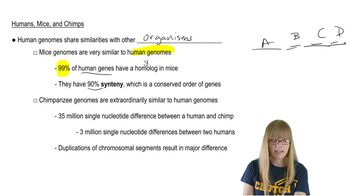Here are the essential concepts you must grasp in order to answer the question correctly.
DNA Polymerase
DNA polymerase is an enzyme responsible for synthesizing DNA molecules from deoxyribonucleotides, the building blocks of DNA. It plays a crucial role in DNA replication, ensuring that genetic information is accurately copied during cell division. DNA polymerase requires a primer to initiate synthesis and can only add nucleotides in a 5' to 3' direction.
Recommended video:
RNA Polymerase
RNA polymerase is an enzyme that synthesizes RNA from a DNA template during the process of transcription. Unlike DNA polymerase, RNA polymerase does not require a primer to start synthesis and can initiate RNA synthesis at specific promoter regions on the DNA. It also synthesizes RNA in a 5' to 3' direction but produces single-stranded RNA molecules.
Recommended video:
Similarities and Differences
Both DNA and RNA polymerases are essential enzymes in nucleic acid synthesis, sharing similarities such as directionality of synthesis (5' to 3') and the requirement for a template strand. However, they differ in their substrates (deoxyribonucleotides for DNA polymerase and ribonucleotides for RNA polymerase), their roles in the cell (replication vs. transcription), and their initiation mechanisms (requirement of a primer for DNA polymerase vs. no primer for RNA polymerase).
Recommended video:






